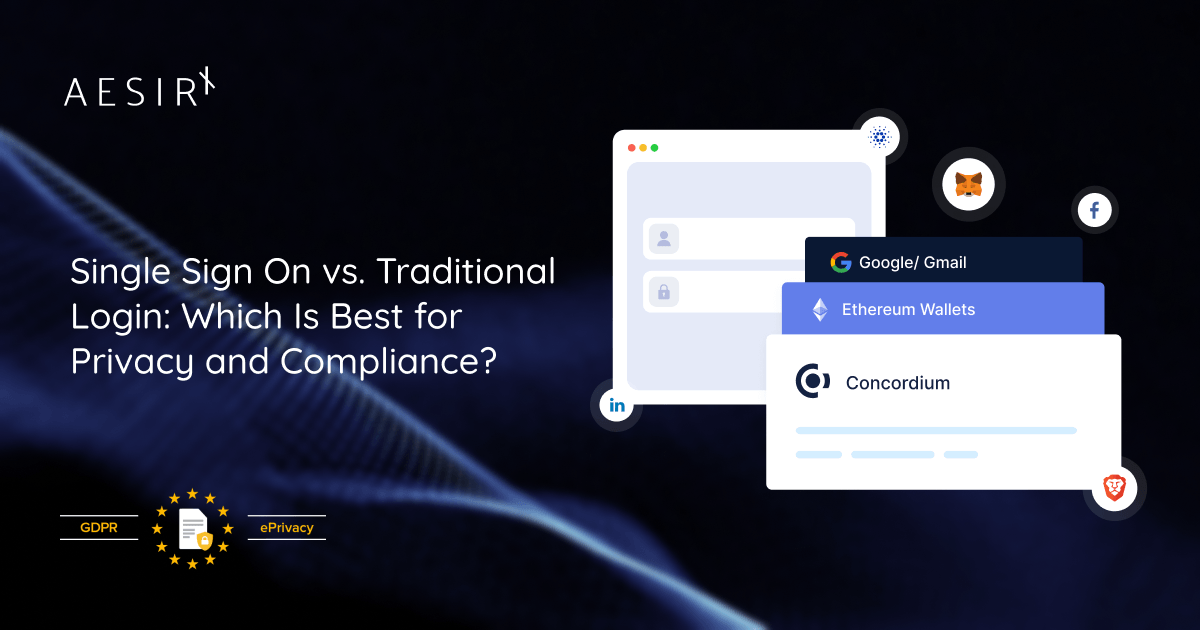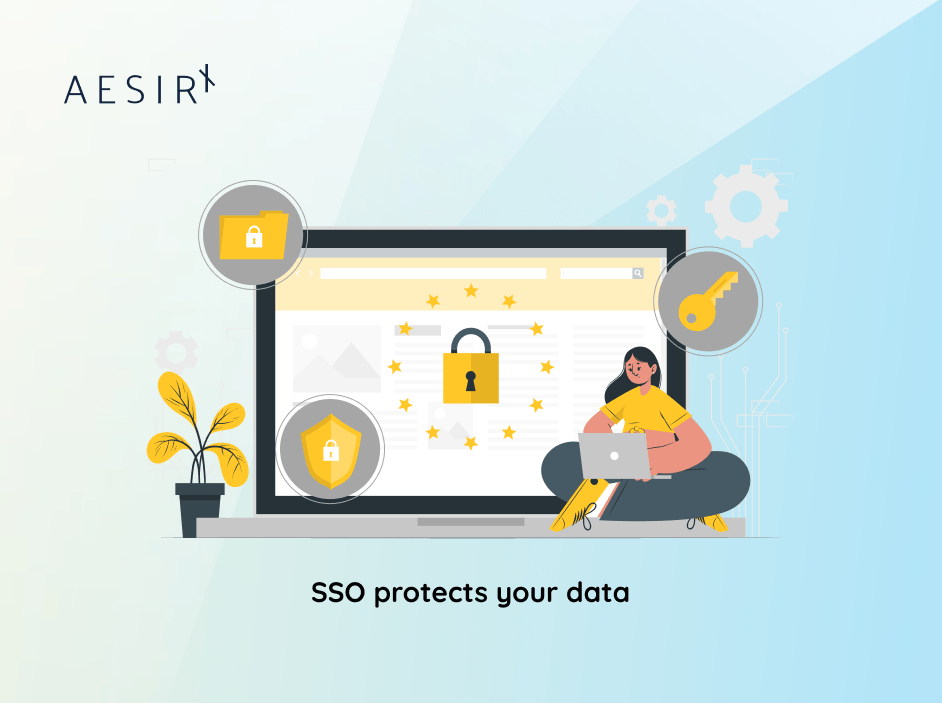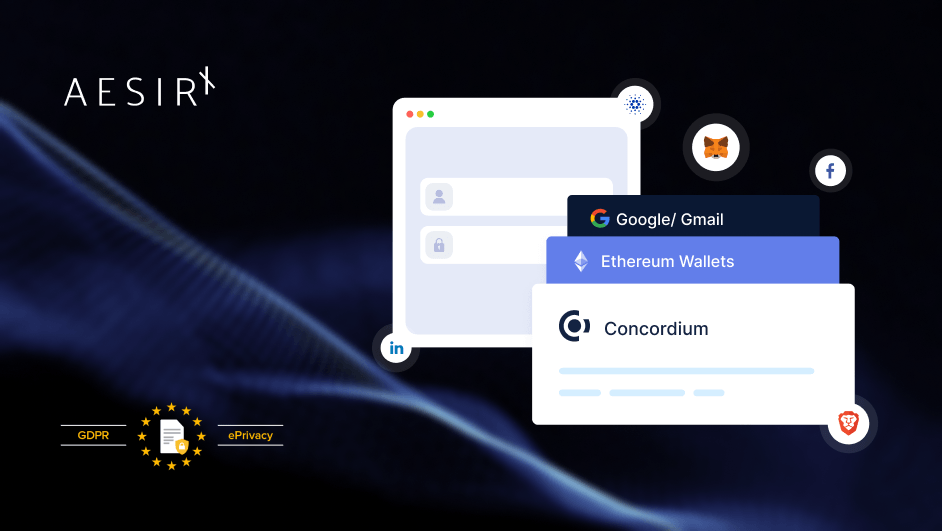For businesses, it’s a balancing act: making it easy for employees to access multiple apps while keeping data secure and respecting privacy rules. The choice between Single Sign On (SSO) and traditional login systems plays a big part in getting this right.
SSO simplifies access by letting users log in once and access several apps, while traditional logins create a unique login for each app. Each approach has its strengths, but also some trade-offs, especially when it comes to privacy and meeting compliance standards.
In this blog, we’ll take a closer look at how each option affects data privacy and security. By understanding the pros and cons of each, you’ll be better prepared to decide which solution makes sense for your organization.

What is Traditional Login?
Traditional login means creating separate usernames and passwords for each app or website you use. While it gives each platform control over access, it can quickly become a hassle. Managing multiple logins often leads to “password fatigue,” where users reuse simple passwords across sites – opening the door to security issues.
Traditional Login Privacy and Compliance
For businesses, traditional logins can complicate privacy and data management. Each application operates with its own security standards, which makes tracking and securing user data across platforms more challenging. If employees or customers reuse weak passwords, the risk of data breaches rises, leading to potential compliance gaps – particularly concerning for industries handling sensitive data, where strict privacy regulations must be met.
What is Single Sign On (SSO)?
Single Sign On (SSO) simplifies access by allowing users to log in once and access multiple connected apps seamlessly. While it’s often compared to a “master key” for its convenience, the underlying mechanics rely on secure protocols like OAuth, SAML, or OpenID Connect. These frameworks authenticate users by issuing tokens that act as temporary access credentials for other authorized applications.
This means that instead of repeatedly transmitting sensitive login credentials, SSO exchanges secure tokens between applications, significantly reducing the risk of credential theft while enhancing both user convenience and security.
Here’s an example: imagine you log into your favorite eCommerce platform. With SSO, that one login can let you access other connected sites or services seamlessly – think of going from a product review site to your payment service provider without logging in again.
SSO Privacy and Compliance
For companies, SSO simplifies managing logins, meaning data privacy is easier to oversee. With login details stored by one identity provider, businesses handling sensitive information, like payment details, can reduce the risks of mishandling data, aiding compliance efforts across sectors that rely on protecting customer trust.

Comparing SSO and Traditional Login: Key Differences for Privacy and Compliance
SSO is ideal for organizations with integrated software ecosystems, such as a company using CRM, email, and collaboration tools. In contrast, traditional logins might work better for standalone applications, such as internal databases or tools used by contractors.
|
Aspects |
SSO (Single Sign On) |
Traditional Login |
|
1. User Experience |
Simplifies access with one login across apps, reducing login fatigue. |
Requires separate logins, which can lead to frustration and poor password practices. |
|
2. Data Privacy |
A unified login system simplifies data control and privacy management. |
Fragmented control complicates the enforcement of data privacy policies. |
|
3. Compliance |
Consolidates access data, simplifying compliance efforts. |
Compliance is fragmented, making it harder to maintain uniform standards. |
|
4. Security Risks |
A compromised SSO affects all apps, but strong security measures like MFA mitigate this risk. |
Limits breach impact to one app, but weak password habits increase overall risk. |
|
5. Data Minimization |
Reduces the amount of user data stored across applications. |
Each application collects user data independently, potentially leading to excessive data retention if not managed properly. |
|
6. User Consent Management |
Facilitates unified consent management, allowing users to manage permissions easily. |
Requires separate consent agreements for each application, complicating user control. |
|
7. Audit Trail |
Centralized records simplify tracking access and compliance audits. |
Separate records complicate comprehensive audits. |
AesirX SSO: A Privacy-First Single Sign On Login Solution
AesirX SSO is designed to simplify user access across multiple applications with one login, whether through a single password or passwordless authentication methods like zero-knowledge proofs, Multi-Factor Authentication (MFA), and Concordium Wallet integration.
By centralizing user data and reducing redundant storage, AesirX SSO supports GDPR’s data minimization principle. Additionally, the integration of the Shield of Privacy empowers users to manage consent across applications, aligning with GDPR Article 7 requirements for explicit and informed consent. This reduces login friction while enhancing privacy, security, and compliance with global privacy regulations.
Key Security Features
1. Web3 Wallet Support
Beyond traditional login options, AesirX SSO supports decentralized Web3 wallets. This feature enables a blockchain-based authentication system, giving users more control over their identities and ensuring secure, decentralized access without relying on conventional username/password pairs. However, the practicality and effectiveness of these blockchain solutions may differ depending on specific use cases and current technology adoption levels.
With Web3 wallet support, AesirX SSO shifts control of user credentials to individuals, eliminating reliance on centralized databases and reducing the risk of large-scale breaches. This decentralized approach not only safeguards user data but also builds trust in your organization’s commitment to privacy. However, the practicality and effectiveness of these blockchain solutions may differ depending on specific use cases and current technology adoption levels.
2. Concordium’s Zero Knowledge (ZK) Technology
Private information is securely and privately protected by state-of-the-art security built on Concordium's Zero Knowledge (ZK) technology. This advanced security approach allows user identity verification without exposing sensitive data. It verifies only necessary information, safeguarding users' private data and supporting GDPR standards.
3. Multi-Factor Authentication (MFA)
AesirX SSO strengthens security with MFA, requiring multiple verification steps. For example, it uses the Concordium Wallet for secure blockchain-based authentication, with factors like:
- Something the user knows: e.g., password or PIN.
- Something the user has: the Concordium Wallet, which stores private credentials and generates zero-knowledge proofs for attributes like age or country without exposing actual data.
4. AesirX Shield of Privacy
AesirX SSO can be used as a stand-alone service, but when connected with AesirX Shield of Privacy, it adds a layer of control for managing user consent and privacy settings. It allows users to decide how their data is used across applications while providing role and permission-based access for precise control over resources.
By supporting centralized data management and minimizing redundant data storage, the Shield of Privacy aligns with GDPR’s Article 25 (data protection by design) and Article 32 (security of processing). These features ensure that privacy measures are integrated into the system from the outset, while also protecting user data through advanced security protocols.
Benefits of AesirX SSO
⮕ Seamless Access: Users enjoy a more straightforward login experience, accessing all connected applications with a single sign on, which improves both productivity and user experience.
⮕ High Security and Compliance: Using ZK technology and the Shield of Privacy, AesirX SSO provides a strong defense against unauthorized access, with users’ data remaining protected and compliant with privacy laws.
⮕ User Data Control: The AesirX Shield of Privacy allows users to manage personal data preferences, giving them greater control over their information and building trust in how their data is handled.
⮕ Flexible Login Options: Users can log in via Web2 methods (social media or email/password) or Web3 using decentralized wallets, catering to diverse security preferences and enhancing accessibility.

Single Sign On vs. Traditional Login: Choosing the Right Solution for Privacy and Compliance
When it comes to balancing security with convenience, choosing between Single Sign On and traditional logins requires a close look at your organization’s needs.
SSO is great for simplifying access, especially with extra layers like Multi-Factor Authentication (MFA) or decentralized tech. It centralizes control over user data, making it easier to monitor privacy standards across multiple apps. Traditional logins might be better for apps where users need separate access, but they come with the hassle of managing multiple passwords, which can add security concerns.
Think through what fits best. Choosing the right approach can keep you in line with privacy standards, make access simpler, and help you build a secure setup that truly supports your organization’s needs.
Transform your access management with AesirX SSO. Simplify logins, enhance security with blockchain-based authentication, and enable compliance with global privacy regulations. Schedule a demo today to see how AesirX can optimize your organization’s privacy and access strategy.
Sources:
- GDPR Article 7: Conditions for Consent.
- AesirX SSO: Simplified and Secure Single Sign On Solution.
- GDPR Article 25: Data Protection by Design and by Default.
- GDPR Article 32: Security of Processing.




